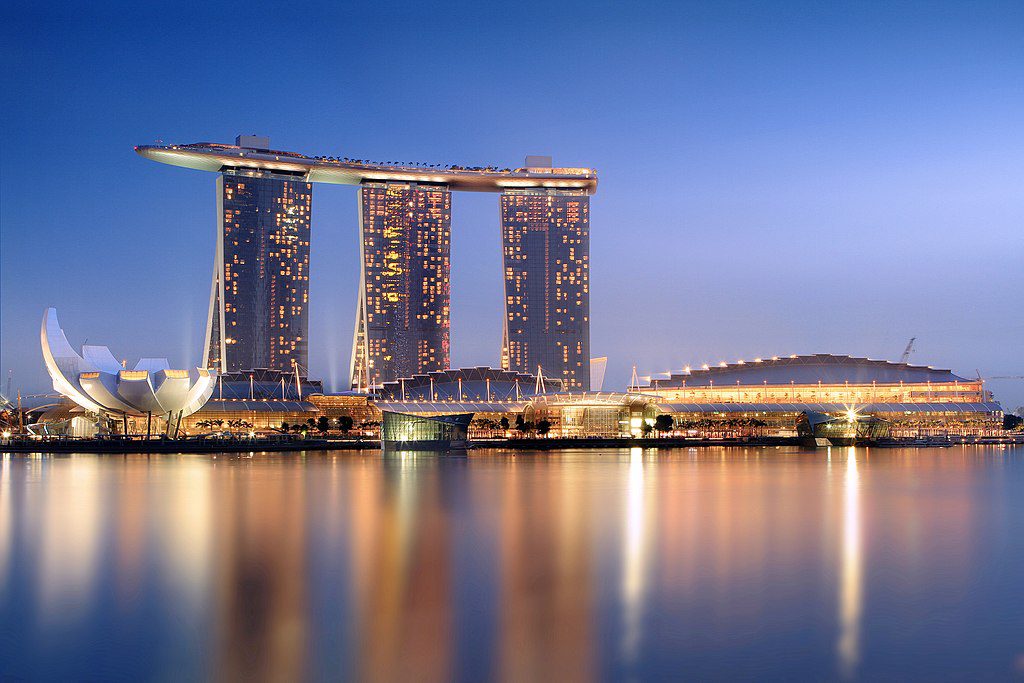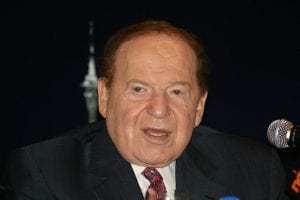Sheldon Adelson's Legacy Changed Resorts and Casinos Forever

Skift Take
Las Vegas Sands founder Sheldon Adelson, leader of the world’s largest gaming company and benefactor of many Republican political campaigns, died Monday night from non-Hodgkin’s lymphoma complications, his company announced Tuesday.
He went on medical leave from his company earlier this month to resume treatment of the cancer first diagnosed in 2019. Adelson was 87.
The look, feel, and economics of global cities that are gaming resorts today were shaped through the decades by Adelson's lead, mostly by creating a nexus between business gatherings and hotels.
While Forbes estimated the casino mogul’s net worth at $35 billion, he started out far away from the glitz surrounding his resorts like Singapore’s Marina Bay Sands or the Venetian in Las Vegas. The son of Ukrainian-Jewish parents who drove a taxi and ran a knitting shop, Adelson grew up in Boston’s working-class Dorchester neighborhood selling newspapers on street corners as a child.
Adelson changed the game in Las Vegas where his casino resorts included a convention center, practically an industry standard today. But his road to Sin City was not a straight path.
He started a candy vending machine business in his teenage years before attending trade school to become a court reporter.
After a stint in the U.S. Army, Adelson’s entrepreneurial spirit led him to run a toiletry kit business and later one for the De-Ice-It windshield chemical spray. Charter tours and computer trade show businesses followed and helped Adelson amass his fortune. He started or was involved in more than 50 different companies, according to the Las Vegas Sands Corp. website.
Adelson and his business partners bought the Sands Hotel and Casino in Las Vegas in the late 1980s. The legendary resort, a popular hangout for Rat Pack entertainers like Frank Sinatra and Sammy Davis Jr., was toward the end of its working life — but Adelson saw plenty of potential.
He quickly moved to build the adjoining Sands Expo and Convention Center, which opened in 1990 and was the world’s second-largest convention center at the time. The close proximity of convention hall, casino floor, and hotel rooms was a successful model and enabled guests to tend to business during the day and gamble and peruse other resort attractions at night.
Adelson built upon the model by demolishing the aging Sands and replacing it with the $1.5 billion Venetian Resort. First opened in 1999, the Venetian has since been expanded to more than 7,000 rooms and is the world’s second-largest hotel.
“The opening of The Venetian in 1999 was the real beginning of our company’s story, and it also launched a new era of integrated resort development around the world,” Adelson told the Las Vegas Review-Journal in 2019. “The Venetian’s success in Las Vegas, and particularly our convention-based business strategy, would end up being the basis for our company receiving coveted licenses in Macao and Singapore.”
He was early to recognize the gaming potential in China, eventually opening the Sands Macau and Venetian Macau. The Marina Bay Sands in Singapore opened in 2010.
Las Vegas Sands became so engrossed with Macau, now a much larger gaming destination than Las Vegas, that the company was reportedly exploring a sale last fall of all its Vegas assets.
Political Kingmaker
As Adelson amassed his fortune, conservative politicians increasingly sought his financial backing and blessing in their rise to power. Despite the mogul’s upbringing as a Democrat, he cited the Republican Party’s foreign policy stance as a key motivation for moving to the right.
“My critics nowadays like to claim it's because I got wealthy or because I didn't want to pay taxes or because of some other conservative caricature,” Adelson wrote in a 2012 Wall Street Journal op-ed. “No, the truth is the Democratic Party has changed in ways that no longer fit with someone of my upbringing.”
Adelson went on to donate hundreds of millions of dollars to Republican candidates like former President George W. Bush and more recently President Donald Trump. A last-minute $75 million donation in October had Adelson on track to spend somewhere around $200 million backing Trump’s failed reelection campaign.
His financial clout was so mighty that Republican circles called it the “Adelson primary” where candidates flew to Las Vegas seeking his blessing and wallet.
“Sheldon battled his way out of a tough Boston neighborhood to build a successful enterprise that loyally employed tens of thousands — and entertained millions. He was an American Patriot, a generous benefactor of charitable causes, and a strong supporter of Israel,” Bush said in a statement. “He will be missed by many — none more than his beloved family.”
Adelson garnered respect from at least one politician on the other side of the aisle who also came from his own backyard: former Senate Majority Leader Harry Reid (D-Nev.).
While the senator notoriously went after other GOP billionaires like the Koch brothers for their campaign contributions, Reid didn't extend that criticism for Adelson.
"I know Sheldon Adelson," Reid said in 2014. "He’s not in this for money."
While that was a widely-challenged take, Reid still expressed his condolences to the Adelson family Tuesday.
“Few people have had such significant an impact on the hotel and gaming industry and on Nevada’s economy as Sheldon Adelson. He came to Las Vegas as a master of the convention business,” Reid said in a statement. “He was instrumental in transforming Las Vegas into the iconic destination it is today.”
[UPDATE: Since publication, former U.S. Sen. Harry Reid (D-Nev.) issued a statement on Adelson's passing. This story has been updated.]





